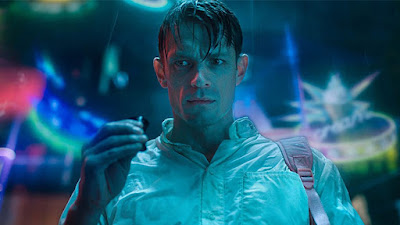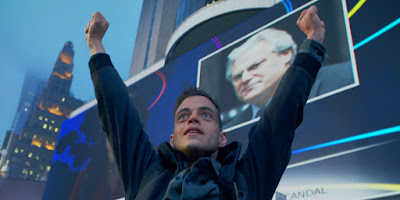TV Review: Altered Carbon - Season 1
From creator Laeta Kalogridis, who has penned scripts for everything from bold psycho-thrillers like 2010's Shutter Island to more lackluster endeavors like 2015's Terminator Genisys, comes the writer's first major leap into television with her ambitious adaptation, Altered Carbon. Blazing forward with an enigmatic cyberpunk aesthetic to rival that of Blade Runner, the latest series to hit the streaming service of Netflix aimed to inject a versatile collection of stories into one extravagant science fiction backdrop. From murder mysteries to identity crises, while Altered Carbon might not balance its grim tales of revenge and intrigue to perfection, the series still managed to pull off an effective first season -- one full of brutal science-fiction thrills, and plenty of thematic grace.
In the year 2384, a person's consciousness can be decanted into a disk-shaped implant called a "cortical stack". With the use of synthetic bodies known as "sleeves", engineered and mass produced across the universe to act as vessels to any person's stack, immortality can be reached simply by how much one is willing to pay for it. For the rich, like Laurens Bancroft (James Purefoy), the afterlife is but an afterthought to the elite and protected. For political-operative-turned-mercenary Takeshi Kovacs (Joel Kinnaman), who wakes up 250 years after his old sleeve is terminated, your sleeve is the only survival tool you have against the brutal outside world. When Kovacs is brought in to investigate the murder of the wealthy Bancroft, the outside world -- as well as its equally-unnerving interior -- comes crashing down around him as the ex-militant must evade the deadly forces of the ever-evolving future.
While Netflix's latest original series in Altered Carbon might have taken a while to fully capture my interest, finally diving into the series, there was plenty to be enjoyed in its cyberpunk-infused premise. Establishing its primary selling point right from the start, mocking up a grim, technologically-driven society packed to the brim with multiple shades of creative allure, Altered Carbon let its science-fiction aesthetic speak for itself for the majority of the season. While clearly reminiscent of the dystopian Los Angeles we saw in the likes of 1982's Blade Runner (and its subsequent sequel thirty years later), the show only seemed to scratch the surface of its dense city streets, all before shooting promptly off towards the stars. Still, while the show might juggle with its immense atmosphere only to explore a thin layer of its futuristic society, the bold sci-fi visuals were definitely one of the hallmarks of the season.
Beneath its flashy facade, however, lied another juggling of themes, as the show steadily bounced from a semi-compelling murder mystery into a far-more-interesting character study of its central protagonist. All the while balancing its outlook on immortality and the subtle duality between the rich and the poor, Altered Carbon delivered an intriguing set of storylines to populate its mostly-coherent premise. While I yearned for the series to go deeper with its take on the class system and the inherent corruption within, its grasp of the central concept of the "cortical stack" deemed enough to not only get me somewhat invested in the characters' life and death, but their motivations to either control their fate, or merely let nature take its course.
Even as the majority of the show's marketing geared more towards its cerebral sci-fi look and ambitious philosophy, the show's cast actually ended up being one of the more favorable elements of the first season. Filling its roster with an intriguing line-up of both unknowns and familiar faces, the show worked to give a dynamic personality to each character, allowing them to shine above the gloom and glare of the world they inhabit. While some shined better than others, like Chris Conner's gun-totting AI hotel concierge (modeled humorously after famed poet Edgar Allen Poe), others, like James Purefoy's cryptic billionaire Laurens Bancroft, failed to offer much of a lasting impression on the overall story. Even as Joel Kinnaman's crooked ex-militant led the season with promising and grisly results, his intersection with Bancroft seemed to be the weakest link of the sci-fi extravaganza. In contrast to that, surprisingly, the strongest element from the cast was between that of Will Yun Lee and his band of rebel militants, in a side story that told of Takeski Kovacs' time before donning Kinnaman's rage-fueled facade.
Overall, while much of Netflix's ambitious adaptation of Richard K. Morgan's cyber-thriller saga set its sights on filling the screen with often-gratuitous sci-fi gunplay and plenty of filler material to keep the thrills alive, Altered Carbon presented a dynamic first entry of what could be a promising world to explore. With the streaming service showing no signs of slowing down production on over hundreds of original programming, it seems likely we'll see a return to the grisly future we saw in Season 1. Despite a few missteps along the way, as the series verged from plot point to plot point with a somewhat narrow gaze, Altered Carbon was ultimately effective fodder for any fan of cerebral and unyielding science fiction to enjoy.
I gave Season 1 of Altered Carbon a 7 out of 10 for its bold visual palette eager to rival the likes of other classic cyber-classics, its effective cast led by the vehement charisma of Joel Kinnaman, and its ambitious potential eager to surpass its mistakes and become what could be a new sci-fi gem for the small screen.






Comments
Post a Comment